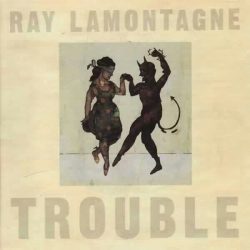 At the end of the 2010 Ben Affleck directed and starred in the movie ‘The Town’, Affleck’s character (spoiler alert) manages to flee the police, although that tragically means he has to leave behind the object of his affection (Rebecca Hall). It has a bittersweet ending when Hall finds a note and some money he’s left buried for her, and as the film ends, we see Affleck looking out over the water by his home at sunset, his voice reading the note in narration. He’s alone but still hopeful as we fade to black, but it’s seconds later when Ray LaMontagne’s ‘Jolene’ kicks in that the heartache truly hits. Such is the power of LaMontagne’s smoky voice and evocative words, showcased nowhere better than on ‘Jolene’ (a song that has gone on to become a certified standard) and indeed throughout the 2004 album it appears on, ‘Trouble’.
At the end of the 2010 Ben Affleck directed and starred in the movie ‘The Town’, Affleck’s character (spoiler alert) manages to flee the police, although that tragically means he has to leave behind the object of his affection (Rebecca Hall). It has a bittersweet ending when Hall finds a note and some money he’s left buried for her, and as the film ends, we see Affleck looking out over the water by his home at sunset, his voice reading the note in narration. He’s alone but still hopeful as we fade to black, but it’s seconds later when Ray LaMontagne’s ‘Jolene’ kicks in that the heartache truly hits. Such is the power of LaMontagne’s smoky voice and evocative words, showcased nowhere better than on ‘Jolene’ (a song that has gone on to become a certified standard) and indeed throughout the 2004 album it appears on, ‘Trouble’.
When you hear LaMontagne sing, it feels like he must have been born with the desire to make music in his bones, but the truth is a little more ordinary. After leaving high school at 17, he drifted throughout America taking a number of menial jobs, culminating with him working in a shoe factory in New Hampshire in his mid-20s, and it was only when he heard the Stephen Stills’ album ‘Manassas’ that he got bitten with the songwriting bug (“Some people find Jesus,” he later said. “I found Stephen Stills.”). He went on to self-release a number of records from 1999 onwards before finally releasing ‘Trouble’ with RCA in 2004 – but having a major label deal didn’t mean he was going to start playing by the rules. LaMontagne is known for being notoriously publicity shy, a man who even when it comes to live performances, has in the past chosen to perform in total darkness. But as is the case with so many great musicians, these perceived foibles only make the songs stand even greater as they are, alone with little explanation.
With just the opening bars, the first and title track of ‘Trouble’ is instantly recognisable and positively rousing not only musically, but lyrically too. “Trouble been dogging my soul since the day I was born,” he laments sadly at first, expressing the sentiment in the same way repeatedly in the song, only on the chorus to tell with relief: “I’ve been / Saved by a woman / She won’t let me go.” On the liltingly acoustic ‘Shelter’, LaMontagne reminisces over the end of a relationship, “I left you heartbroken / But not until those very words were spoken”, but more than that, the song is about the love the two people still share and, just maybe, how they can heal together, “You will shelter me, my love / And I, I will shelter you”.
‘Hold Me in Your Arms’, dripping with strings and heavy emotion, is a simple love song at its core. “When you kissed my lips with my mouth so full of questions / My worried mind that you quiet,” he sings to a love that is a constant, a soothing balm to a hectic world whose arms, as he repeats on the chorus, he would prefer never to leave. ‘Forever My Friend’ takes a look at a relationship that’s been through a lot, concluding that giving up is not the solution to their problems, and that they should try to “keep [their] hearts together” and “build on this trust that [they] have for one another”.
The powerful ‘Burn’ can very well be viewed as a follow-up to ‘Jolene’, the story after our narrator has walked away from the relationship that can’t be, no matter how much it hurts, only for them to see their former lover with another. “Try to ignore / All this blood on the floor / It’s just this heart on my sleeve that’s bleeding,” he sings, the pain of the words made even more palpable from the rasp of his voice. “Oh so kiss him again / Just to prove to me that you can,” he taunts the one he loves, before concluding: “I will stand here / And burn in my skin.” ‘All The Wild Horses’ is unassuming, but still heartbreaking. “All the wild horses / Tethered with tears in their eyes / May no man’s touch ever tame you / May no man’s reigns ever chain you / And may no man’s weight ever lay afraid your soul,” LaMontagne sings, his voice quivering in unfailing tenderness.
Something of an anomaly, ‘How Come’ feels very different from the tracks that preceded it. Initially it sets itself apart with its blast of bluesy guitar riffs, but more than that, it’s the lyrics that don’t speak of personal relationships and instead focus on the problems society faces as a whole, that really make it stand out. “I said how come / I can’t tell / The free world / From living hell?” LaMontagne expresses with frustration. “I said how come / How come / All I see / Is a child of God / In misery?” he asks, even as he knows he’ll never get an answer.
On the back of ‘Trouble’ in 2004, LaMontagne gave a rare interview. “I’m realistic,” he said. “I know damn well that next year, if not next month, there’s going to be somebody else everyone is psyched about. I’m going to be old news real fast. Maybe the momentum could carry over to the next record and people who like the shows and the songs will stick with me and see where it goes next. That’s all I can hope for.” I think it’s fair to say he has achieved that goal, releasing a further seven albums in the years since, culminating with 2020’s ‘Monovision’. A true return to his more lo-fi best, ‘Monovision’ put his songwriting and voice front and centre, proof if it were needed that he can be relied on to keep producing standards worthy of a place on ‘Trouble’ for years to come.



